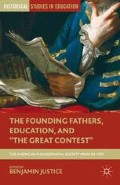Abstract
In January 1788, Satan contributed a series of letters to Noah Webster’s American Magazine. Addressing the rising tide of educational reform proposals in the United States and abroad, the Devil wished to offer his own plan for instructing American youth. Not surprisingly, he focused on moral education. He was especially enthusiastic about the sensational book Emile (1762), and especially hostile to that sturdy New England Calvinism espoused by, among other people, the droll young editor of the magazine. “Follow my paradoxical friend Rousseau’s advice as to religion,” he urged readers. “Let all instruction on this subject come as late as possible. Children who learn with wonderful facility all other branches of knowledge, cannot conceive that they shall be accountable for their actions; that the Diety is witness to all they do, and will reward the good, and punish the bad.” If children learned to behave and think long enough without religious teaching, Satan enthused, “you may then preach religion as much as you please; for it will have little effect.”1
Access this chapter
Tax calculation will be finalised at checkout
Purchases are for personal use only
Preview
Unable to display preview. Download preview PDF.
Notes
Benjamin Rush, “A Plan for the Establishment of Public Schools and the Diffusion of Knowledge in Pennsylvania; to which are added Thoughts Upon the Mode of Education, Proper in a Republic” (Philadelphia: 1786), 14.
Jon Butler, “Why Revolutionary America Wasn’t a ‘Christian Nation,’” in James H. Hutson (ed.), Religion and the New Republic: Faith in the Founding of America (New York: Rowman and Littlefield, 2000), 187–202.
See chapters 6 and 7 in this volume; Hilary Moss, Schooling Citizens: The Struggle for African-American Education in Antebellum America (Chicago: University of Chicago Press, 2009);
Margaret A. Nash, Women’s Education in the United States, 1780–1840 (New York: Palgrave MacMillan, 2005).
Robert Coram, Political Inquiries, to which is Added a Plan for Establishing Schools throughout the United States (Wilmington, 1791), Chapter V.
As cited in James Pyle Wickersham, A History of Education in Pennsylvania, Private and Public, Elementary and Higher (Lancaster: 1886), 257.
Adam Smith, An Inquiry into the Nature and Causes of the Wealth of Nations (1776), book V, Chapter 1.
Samuel Knox, An Essay on the Best System of Liberal Education (Baltimore: Warner and Hanna, 1799), 12.
Thomas Jefferson, “A Bill for the More General Diffusion of Knowledge,” in Merrill D. Peterson (ed.), Thomas Jefferson: Writings (Washington, DC: Library of America, 1984), 365–373; Wagoner, Jefferson and Education, 40–42. Pangle and Pangle argue that Madison’s view of the role for religion in civic education was even more radical than Jefferson’s: Madison saw no role whatsoever, while Jefferson conceded the need for a very narrow, deist interpretation of Christianity as sound basis for moral instruction. Lorraine Smith Pangle and
Thomas L. Pangle, The Learning of Liberty: The Educational Ideas of the Founders (Lawrence: University Press of Kansas, 1993), 188–194.
William T. Harris speculated that the scaling back of educational requirements was a political response to the unpopularity of entrenched “ecclesiastical control.” See “Editor’s Preface,” in George H. Martin, The Evolution of the Massachusetts Public School System: A Historical Sketch (New York: D. Appleton, 1894), xi. Carl Kaestle and Maris Vinovskis have argued that in its first few decades of existence, a significant private market in education existed alongside this public system, the latter of which had uneven effects depending on the size of a community.
Carl F. Kaestle and Maris A. Vinovskis, Education and Social Change in Nineteenth-Century Massachusetts (London: Cambridge University Press, 1980).
Benjamin Rush, Essays, Literary, Moral, and Philosophical (Philadelphia: Bradfords, 1798), 9.
Jefferson, “A Bill for the More General Diffusion of Knowledge,” 367; Smith, Remarks on Education, p. 213 of this volume; “Review of Essay No. 3,” p. 235 of this volume; DuPont de Nemours, National Education in the United States of America. Translated from the Second French Edition of 1812 and with an Introduction by B. G. Du Pont (Newark, DE: University of Delaware Press, 1923), 73; Hand, “Concerning Education in Public Schools,” p. 257 of this volume.
Richard M. Rollins, The Long Journey of Noah Webster (Philadelphia: University of Pennsylvania Press, 1980), 109.
Letter to William T. Barry, August 4, 1822, and letter to Edward Everett, March 19, 1823, in Jack Rakove (ed.), James Madison. Writings (Library of America, 1999), 790–798.
Letter to Jefferson, June 25, 1813, in Lester J. Cappon (ed.), The Adams-Jefferson Letters: The Complete Correspondence between Thomas Jefferson and Abigail and John Adams, 2 vols (Chapel Hill: University of North Carolina Press, 1959), 334.
John Adams, A Dissertation on Canon and Feudal Law (1765), downloaded from the Massachusetts Historical Society Website at http://www.masshist.org/publications/apde/portia.php?mode=p&id=PJA01p108.
Samuel Smith, Remarks on Education (Philadelphia: 1798), pp. 23, 26.
Cappon, The Adams-Jefferson Letters, 509, 512, 515; Eugene Sheridan, “Liberty and Virtue: Religion and Republicanism in Jeffersonian Thought,” in James Gilreath (ed.), Thomas Jefferson and the Education of a Citizen (Honolulu: University Press of the Pacific, 2002), 242–263.
Editor information
Copyright information
© 2013 Benjamin Justice
About this chapter
Cite this chapter
Justice, B. (2013). The Place of Religion in Early National School Plans. In: Justice, B. (eds) The Founding Fathers, Education, and “The Great Contest”. Historical Studies in Education. Palgrave Macmillan, New York. https://doi.org/10.1057/9781137271020_9
Download citation
DOI: https://doi.org/10.1057/9781137271020_9
Publisher Name: Palgrave Macmillan, New York
Print ISBN: 978-1-349-44453-3
Online ISBN: 978-1-137-27102-0
eBook Packages: Palgrave Education CollectionEducation (R0)

